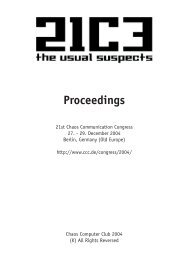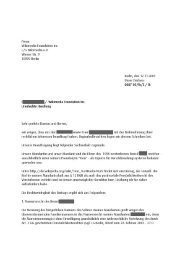- Page 2 and 3:
| 2
- Page 5 and 6:
22. Chaos Communication Congress Pr
- Page 7 and 8:
REPORTS 7 5 Thesis on Informational
- Page 9 and 10:
10 5 Thesis on Informational- Cogni
- Page 11 and 12:
5 THESIS ON INFORMATIONAL-COGNITIVE
- Page 13 and 14:
5 THESIS ON INFORMATIONAL-COGNITIVE
- Page 15 and 16:
5 THESIS ON INFORMATIONAL-COGNITIVE
- Page 17:
5 THESIS ON INFORMATIONAL-COGNITIVE
- Page 20 and 21:
UQBTng: a tool capable of automatic
- Page 22 and 23:
IV. UQBT MODIFICATIONS A. Summary A
- Page 24 and 25:
• if LHS of A is exactly sem str,
- Page 27 and 28:
Advanced Buffer Overflow Methods [o
- Page 29 and 30:
ADVANCED BUFFER OVERFLOW METHODS #i
- Page 31 and 32:
ADVANCED BUFFER OVERFLOW METHODS 0x
- Page 33 and 34:
ADVANCED BUFFER OVERFLOW METHODS in
- Page 35:
ADVANCED BUFFER OVERFLOW METHODS }
- Page 38 and 39:
| 34 Eine Führung in das europäis
- Page 40 and 41:
| 36 Die kryptische Kennung 10 eine
- Page 42 and 43:
| 38 senvertreter angewiesen. Die
- Page 44 and 45:
| 40 Anonymous Data Broadcasting by
- Page 46 and 47:
| 42 operate, consider the setting,
- Page 48 and 49:
| 44 Figure 1: Anonymous data broad
- Page 51 and 52:
Autodafé: An Act of Software Tortu
- Page 53 and 54:
AUTODAFE - AN ACT OF SOFTWARE TORTU
- Page 55 and 56:
AUTODAFE - AN ACT OF SOFTWARE TORTU
- Page 57 and 58:
AUTODAFE - AN ACT OF SOFTWARE TORTU
- Page 59 and 60:
AUTODAFE - AN ACT OF SOFTWARE TORTU
- Page 61 and 62:
Bad TRIPs What the WTO Treaty did i
- Page 63 and 64:
BAD TRIPS The TRIPS is especially h
- Page 65:
BAD TRIPS Extension of the transiti
- Page 68 and 69:
| 64 Collateral Damage Consequences
- Page 70 and 71:
| 66 If one considers a DNSBL listi
- Page 72 and 73:
| 68 • A number of sites do not h
- Page 74 and 75:
| 70 to use other mailing software.
- Page 76 and 77:
| 72 These kinds of checks tend to
- Page 79 and 80:
COMPLETE Hard Disk Encryption with
- Page 81 and 82:
COMPLETE HARD DISK ENCRYPTION WITH
- Page 83 and 84:
COMPLETE HARD DISK ENCRYPTION WITH
- Page 85 and 86:
COMPLETE HARD DISK ENCRYPTION WITH
- Page 87 and 88:
COMPLETE HARD DISK ENCRYPTION WITH
- Page 89 and 90:
COMPLETE HARD DISK ENCRYPTION WITH
- Page 91 and 92: COMPLETE HARD DISK ENCRYPTION WITH
- Page 93 and 94: COMPLETE HARD DISK ENCRYPTION WITH
- Page 95 and 96: COMPLETE HARD DISK ENCRYPTION WITH
- Page 97 and 98: COMPLETE HARD DISK ENCRYPTION WITH
- Page 99 and 100: COMPLETE HARD DISK ENCRYPTION WITH
- Page 101 and 102: COMPLETE HARD DISK ENCRYPTION WITH
- Page 103 and 104: COMPLETE HARD DISK ENCRYPTION WITH
- Page 105: COMPLETE HARD DISK ENCRYPTION WITH
- Page 108 and 109: | 104 x86-64 buffer overflow exploi
- Page 110 and 111: | 106 3 ELF64 LAYOUT AND X86-64 EXE
- Page 112 and 113: | 108 4 THE BORROWED CODE CHUNKS TE
- Page 114 and 115: | 110 5 AND DOES THIS REALLY WORK?
- Page 116 and 117: | 112 6 SINGLE WRITE EXPLOITS 9 48
- Page 118 and 119: | 114 6 SINGLE WRITE EXPLOITS 11 34
- Page 120 and 121: | 116 7 AUTOMATED EXPLOITATION 13 A
- Page 122 and 123: | 118 7 AUTOMATED EXPLOITATION 15 W
- Page 124 and 125: | 120 8 RELATED WORK 17 32 read(soc
- Page 126 and 127: | 122 11 CREDITS 19 11 Credits Than
- Page 129 and 130: Developing Intelligent Search Engin
- Page 131 and 132: DEVELOPING INTELLIGENT SEARCH ENGIN
- Page 133 and 134: DEVELOPING INTELLIGENT SEARCH ENGIN
- Page 135 and 136: Digital Identity and the Ghost in t
- Page 137 and 138: DIGITAL IDENTITY AND THE GHOST IN T
- Page 139 and 140: DIGITAL IDENTITY AND THE GHOST IN T
- Page 141: DIGITAL IDENTITY AND THE GHOST IN T
- Page 145: DIGITAL IDENTITY AND THE GHOST IN T
- Page 148 and 149: | 144
- Page 150 and 151: | 146
- Page 153 and 154: Esperanto, die internationale Sprac
- Page 155 and 156: ESPERANTO, DIE INTERNATIONALE SPRAC
- Page 157 and 158: ESPERANTO, DIE INTERNATIONALE SPRAC
- Page 159 and 160: Fair Code Free/Open Source Software
- Page 161 and 162: FAIR CODE 2. Von Digital Divide zu
- Page 163 and 164: FAIR CODE ökonomisch schlecht gest
- Page 165 and 166: FAIR CODE menschliches Verhalten re
- Page 167: FAIR CODE gewährleistet, und nur d
- Page 170 and 171: �����������
- Page 172 and 173: | 168 ���������
- Page 174 and 175: | 170 ���������
- Page 176 and 177: | 172 ���������
- Page 178 and 179: | 174 ���������
- Page 180 and 181: | 176 ���������
- Page 183 and 184: Fuzzing Breaking software in an aut
- Page 185 and 186: FUZZING or protocol and fuzzing fra
- Page 187 and 188: FUZZING #define SOME_MAX 4096 if (y
- Page 189 and 190: Geometrie ohne Punkte, Geraden & Eb
- Page 191 and 192: GEOMETRIE OHNE PUNKTE, GERADEN & EB
- Page 193:
GEOMETRIE OHNE PUNKTE, GERADEN & EB
- Page 196 and 197:
| 192
- Page 198 and 199:
| 194
- Page 200 and 201:
| 196
- Page 203 and 204:
Hacking OpenWRT Felix Fietkau 199 |
- Page 205 and 206:
HACKING OPENWRT 1 Introduction to O
- Page 207 and 208:
HACKING OPENWRT 3.2 Makefile This f
- Page 209 and 210:
HACKING OPENWRT If your package is
- Page 211 and 212:
HACKING OPENWRT 4.2 toolchain/ tool
- Page 213 and 214:
HACKING OPENWRT To add a new platfo
- Page 215 and 216:
Hopalong Casualty On automated vide
- Page 217 and 218:
HOPALONG CASUALTY 2 Intro to Visual
- Page 219 and 220:
HOPALONG CASUALTY Appearance As hum
- Page 221 and 222:
HOPALONG CASUALTY A thorough review
- Page 223 and 224:
Hosting a Hacking Challenge - CTF-s
- Page 225 and 226:
HOSTING A HACKING CHALLENGE - CTF-S
- Page 227 and 228:
HOSTING A HACKING CHALLENGE - CTF-S
- Page 229:
HOSTING A HACKING CHALLENGE - CTF-S
- Page 232 and 233:
| 228 1 Introduction Intrusion Dete
- Page 234 and 235:
| 230 • Changing file owner / gro
- Page 236 and 237:
| 232 Figure 2: Simple correlation
- Page 239 and 240:
Lyrical I Abschluss des CCC-Poesie-
- Page 241 and 242:
Magnetic Stripe Technology Joseph B
- Page 243 and 244:
MAGNETIC STRIPE TECHNOLOGY black re
- Page 245 and 246:
MAGNETIC STRIPE TECHNOLOGY My curre
- Page 247 and 248:
MAGNETIC STRIPE TECHNOLOGY MetroCar
- Page 249 and 250:
�����������
- Page 251 and 252:
Code Listing (dmsb.c) ����
- Page 253 and 254:
Memory allocator security Yves Youn
- Page 255 and 256:
MEMORY ALLOCATOR SECURITY 251 |
- Page 257 and 258:
MEMORY ALLOCATOR SECURITY 253 |
- Page 259 and 260:
Message generation at the info laye
- Page 261 and 262:
MESSAGE GENERATION AT THE INFO LAYE
- Page 263 and 264:
MESSAGE GENERATION AT THE INFO LAYE
- Page 265 and 266:
MESSAGE GENERATION AT THE INFO LAYE
- Page 267 and 268:
MESSAGE GENERATION AT THE INFO LAYE
- Page 269:
MESSAGE GENERATION AT THE INFO LAYE
- Page 272 and 273:
| 268 Abstract Open Source, EU Fund
- Page 274 and 275:
| 270 lines of code x1e5 1.8 1.6 1.
- Page 276 and 277:
| 272 cooperation. Getting the new
- Page 278 and 279:
| 274 PyPy - The new Python Impleme
- Page 280 and 281:
| 276 performs abstract interpretat
- Page 282 and 283:
| 278 adding short cuts for some co
- Page 284 and 285:
| 280
- Page 286 and 287:
| 282
- Page 288 and 289:
| 284
- Page 290 and 291:
| 286
- Page 292 and 293:
| 288
- Page 294 and 295:
| 290
- Page 296 and 297:
| 292
- Page 298 and 299:
| 294 Die Risiken der Nanotechnik N
- Page 300 and 301:
| 296 Neue Materialien, einer der P
- Page 302 and 303:
| 298 wahrscheinlich nicht ausreich
- Page 304 and 305:
| 300 „State of the Future 2005
- Page 307 and 308:
The Web according to W3C How to tur
- Page 309 and 310:
THE WEB ACCORDING TO W3C 305 |
- Page 311 and 312:
THE WEB ACCORDING TO W3C 307 |
- Page 313:
THE WEB ACCORDING TO W3C our proces
- Page 316 and 317:
| 312 Transparenz der Verantwortung
- Page 318 and 319:
| 314 Transparenz der Verantwortung
- Page 320 and 321:
| 316 (6) Wird dem Betroffenen kein
- Page 322 and 323:
| 318 „anonymes Staatshandeln“
- Page 324 and 325:
| 320 Die Einschränkungen der Grun
- Page 326 and 327:
| 322 11 wie es insbesondere an Hei
- Page 328 and 329:
�����������
- Page 330 and 331:
�����������
- Page 332 and 333:
| 328 ���������
- Page 335 and 336:
Wargames - Hacker Spielen Männlich
- Page 337 and 338:
WARGAMES - HACKER SPIELEN 333 |
- Page 339 and 340:
WARGAMES - HACKER SPIELEN 335 |
- Page 341 and 342:
WARGAMES - HACKER SPIELEN 337 |
- Page 343 and 344:
WARGAMES - HACKER SPIELEN 339 |
- Page 345 and 346:
WARGAMES - HACKER SPIELEN 341 |
- Page 347 and 348:
WARGAMES - HACKER SPIELEN 343 |
- Page 349 and 350:
WARGAMES - HACKER SPIELEN 345 |
- Page 351 and 352:
WARGAMES - HACKER SPIELEN 347 |
- Page 353 and 354:
WARGAMES - HACKER SPIELEN 349 |
- Page 355 and 356:
Was ist technisches Wissen? Philoso
- Page 357 and 358:
WAS IST TECHNISCHES WISSEN? ��
- Page 359 and 360:
WAS IST TECHNISCHES WISSEN? ��
- Page 361 and 362:
WAS IST TECHNISCHES WISSEN? ��
- Page 363 and 364:
WAS IST TECHNISCHES WISSEN? ��
- Page 365 and 366:
WAS IST TECHNISCHES WISSEN? ��
- Page 367 and 368:
�����������
- Page 369 and 370:
�����������
- Page 371 and 372:
WAS IST TECHNISCHES WISSEN? ��
- Page 373:
WAS IST TECHNISCHES WISSEN? ��
- Page 376 and 377:
| 372 ���������
- Page 378 and 379:
�����������
- Page 380 and 381:
�����������
- Page 382 and 383:
| 378
- Page 384 and 385:
| 380
- Page 386 and 387:
| 382
- Page 388 and 389:
| 384
- Page 390 and 391:
| 386
- Page 392 and 393:
| 388
- Page 394:
| 390






